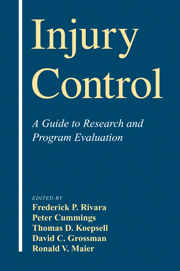Book contents
- Frontmatter
- Contents
- List of Contributors
- 1 An Overview of Injury Research
- 2 Classifying and Counting Injury
- 3 Measurement of Injury Severity and Co-morbidity
- 4 Data Linkages and Using Administrative and Secondary Databases
- 5 Rates, Rate Denominators, and Rate Comparisons
- 6 Data Collection Methods
- 7 Selecting a Study Design for Injury Research
- 8 Qualitative Methods in Injury Research
- 9 Randomized Trials
- 10 Cohort Studies in Injury Research
- 11 Case–Control Studies in Injury Research
- 12 Ecologic Studies
- 13 Case Series and Trauma Registries
- 14 Systematic Reviews of Injury Studies
- 15 Evaluating an Injury Intervention or Program
- 16 The Development of Clinical Decision Rules for Injury Care
- 17 Trauma Performance Improvement
- 18 Measuring Disability and Quality of Life Postinjury
- 19 Economic Evaluation of Injury Control
- 20 Ethical Issues
- Index
10 - Cohort Studies in Injury Research
Published online by Cambridge University Press: 16 October 2009
- Frontmatter
- Contents
- List of Contributors
- 1 An Overview of Injury Research
- 2 Classifying and Counting Injury
- 3 Measurement of Injury Severity and Co-morbidity
- 4 Data Linkages and Using Administrative and Secondary Databases
- 5 Rates, Rate Denominators, and Rate Comparisons
- 6 Data Collection Methods
- 7 Selecting a Study Design for Injury Research
- 8 Qualitative Methods in Injury Research
- 9 Randomized Trials
- 10 Cohort Studies in Injury Research
- 11 Case–Control Studies in Injury Research
- 12 Ecologic Studies
- 13 Case Series and Trauma Registries
- 14 Systematic Reviews of Injury Studies
- 15 Evaluating an Injury Intervention or Program
- 16 The Development of Clinical Decision Rules for Injury Care
- 17 Trauma Performance Improvement
- 18 Measuring Disability and Quality of Life Postinjury
- 19 Economic Evaluation of Injury Control
- 20 Ethical Issues
- Index
Summary
Definition of a Cohort Study
Cohort studies have been used extensively in past decades to describe and identify risk factors for human afflictions or to test specific hypotheses aimed at determining causal relationships between risk factors and outcomes. The definition of a cohort study varies, but most references include a study method in which a designated group of people are defined, some are exposed and some not exposed (or there is variation in degree of exposure) to a factor of interest, and they are followed over a period of time during which observations are made, according to exposure categories, of outcomes such as death or incidence of new affliction (Last, 1995). The key elements in the definition of cohort studies are the designation of a population in which exposure status is determined, then a period of time elapses, and one or more outcomes are observed. The term exposure means any factor which the investigator wishes to study for its possible promotion of or prevention of the study outcomes.
There are a number of merits in cohort studies. Prospective cohort studies may more accurately measure prognostic or risk factors than other study designs as information about the risk factors is generally obtained prior to the onset of outcomes. When a substantial period of time elapses between exposure and outcome, prospective cohort studies, which can measure many explanatory factors long before the outcomes, may have an advantage over case–control studies, which must reconstruct the past exposure history after the outcome events have occurred. Furthermore, a cohort study can measure incidence rates among those exposed and unexposed to the factor(s) of interest (see the chapter by Cummings, Norton, and Koepsell, this volume).
Keywords
- Type
- Chapter
- Information
- Injury ControlA Guide to Research and Program Evaluation, pp. 129 - 138Publisher: Cambridge University PressPrint publication year: 2000



